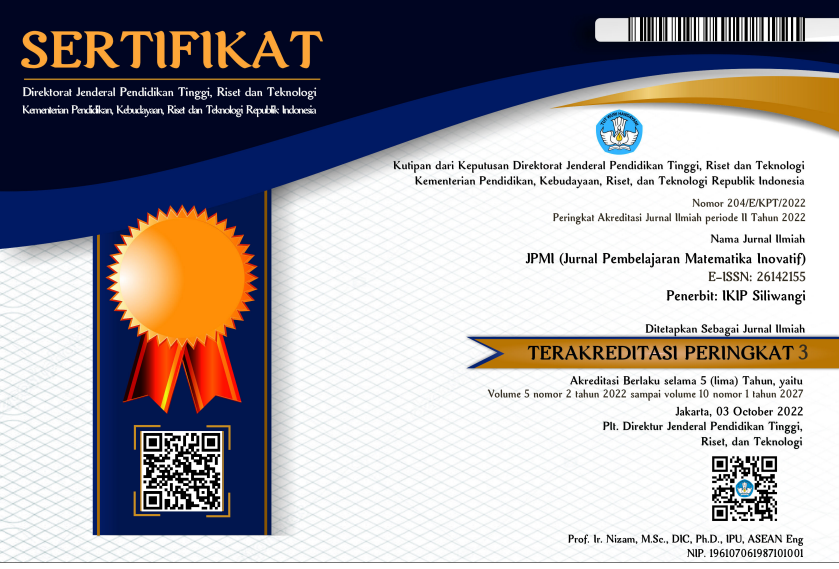TECHNO MATHEMATICS LITERACY MAHASISWA CALON GURU PADA MATERI STATISTIKA PENELITIAN DI IKIP SILIWANGI : SEBUAH ANALISIS
DOI:
https://doi.org/10.22460/jpmi.v6i2.15386Keywords:
Techno Mathematics Literacy, Data Literacy, Sense of errors and numbersAbstract
The purpose of this study was to analyze the Techno mathematics Literacy of non-Mathematics Education Teacher Candidate students in the Research Statistics course. This research is a qualitative descriptive study. The research subjects were 100 non-Mathematics Education students who taught the Research Statistics Course in the Odd Semester of the 2022/2023 Academic Year. Data on learning activities were obtained from the implementation of learning using observation guidelines and data on learning evaluation were obtained from learning evaluation activities based on tests of students' mathematical literacy abilities in the form of document studies, response questionnaires and interview sheets. Based on the results of the study, it can be concluded that the average ability of Techno Mathematics Literacy in the aspects of data literacy, Sense of errors and sense of numbers, and Creative aspects and ability to draw is included in the poor category, while the ability to use computer software and aspects of communication skills are in the Adequate category. Overall, the average Techno Mathematics Literacy of non-Mathematics Education prospective teacher students at IKIP Siliwangi is in the poor category.
References
Daryanes, F., & Ririen, D. (2020). Efektivitas Penggunaan Aplikasi Kahoot Sebagai Alat Evaluasi pada Mahasiswa. Journal of Natural Science and Integration, 3(2). https://doi.org/10.24014/jnsi.v3i2.9283
Gal, I. (2002). Adults’ statistical literacy: Meanings, components, responsibilities. In International Statistical Review (Vol. 70, Issue 1). https://doi.org/10.1111/j.1751-5823.2002.tb00336.x
Gilbert, S. W. (1991). Model building and a definition of science. Journal of Research in Science Teaching, 28(1). https://doi.org/10.1002/tea.3660280107
Güneş, E., & Bahçivan, E. (2018). A mixed research-based model for pre-service science teachers’ digital literacy: Responses to “which beliefs†and “how and why they interact†questions. Computers and Education, 118. https://doi.org/10.1016/j.compedu.2017.11.012
John, B., & Geoff, T. (2013). Thinking Skills: Critical Thinking and Problem Solving. In Cambridge University Press.
List, A., Brante, E. W., & Klee, H. L. (2020). A framework of pre-service teachers’ conceptions about digital literacy: Comparing the United States and Sweden. Computers and Education, 148. https://doi.org/10.1016/j.compedu.2019.103788
Nahdi, D. S., & Jatisunda, M. G. (2020). Analisis Literasi Digital Calon Guru Sd Dalam Pembelajaran Berbasis Virtual Classroom Di Masa Pandemi Covid-19. Jurnal Cakrawala Pendas, 6(2). https://doi.org/10.31949/jcp.v6i2.2133
Polizzi, G. (2020). Digital literacy and the national curriculum for England: Learning from how the experts engage with and evaluate online content. Computers and Education, 152. https://doi.org/10.1016/j.compedu.2020.103859
Porat, E., Blau, I., & Barak, A. (2018). Measuring digital literacies: Junior high-school students’ perceived competencies versus actual performance. Computers and Education, 126. https://doi.org/10.1016/j.compedu.2018.06.030
Pratama, A. P. (2017). Ekuivalen: Analisis Kesalahan siswa dalam Menyelesaikan Soal Matematika Materi Statistika Analisis Kesalahan Siswa Dalam Menyelesaikan Soal Matematika Materi Statistika. Jurnal Ekuivalen, 28(1).
Widodo, W., Sari, D. A. P., Suyanto, T., Martini, M., & Inzanah, I. (2020). Pengembangan keterampilan pemodelan matematis bagi calon guru IPA. Jurnal Inovasi Pendidikan IPA, 6(2). https://doi.org/10.21831/jipi.v6i2.27042
Zulkarnaen, R. (2021). Desain Pembelajaran Berbasis Riset. Prosiding Sesiomadika 2020.

















